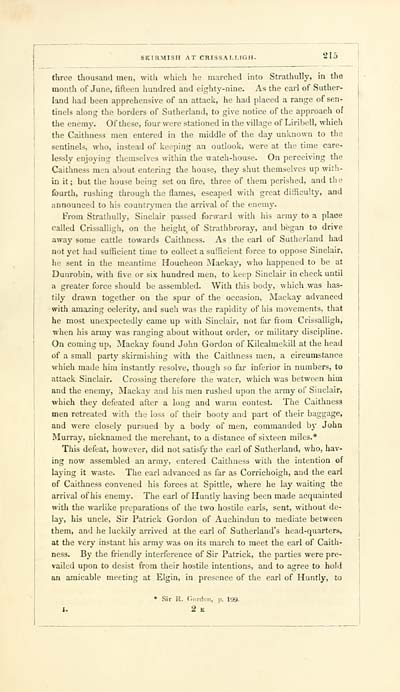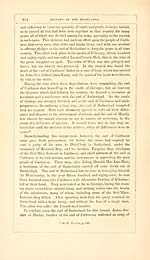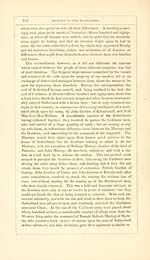Download files
Complete book:
Individual page:
Thumbnail gallery: Grid view | List view

SKIRMISH AT CRISSAI.MGIl. •^'■J
three thousand men, with wliich he marched into Strathully, in the
month of June, fifteen hundred and eighty-nine. As the carl of Suther-
land had been apprehensive of an attack, he had placed a range of sen-
tinels along the borders of Sutherland, to give notice of the approach of
the enemy. Of these, four were stationed in the village of LiriUcll, which
the Caithness men entered in the middle of the day unknown to the
sentinels, who, instead of keeping an outlook, were at the time care-
lessly enjoying themselves witliin the watch-house. On perceiving the
Caithness men about entering the house, they shut themselves up witli-
in it; but the house being set on fire, three of them perished, and the
fourth, rushing through the flames, escaped with great difficulty, and
announced to his countrymen the arrival of the enemy.
From Strathully, Sinclair passed forward with his army to a place
called Crissalligh, on the height, of Strathbroray, and began to drive
away some cattle towards Caithness. As the earl of Sutherland had
not yet had sufficient time to collect a sufficient force to oppose Sinclair,
he sent in the meantime Houcheon Mackay, who happened to be at
Dunrobin, with five or six hundred men, to keep Sinclair in check until
a greater force should be assembled. With this body, which was has-
tily drawn together on the spur of the occasion, Mackay advanced
with amazing celerity, and sucli was the rapidity of his movements, that
he most unexpectedly came up with Sinclair, not far from Crissalligh,
when his army was ranging about without order, or military discipline.
On coming up, Mackay found John Gordon of KilcalmekiU at the head
of a small party skirmishing with the Caithness men, a circumstance
which made him instantly resolve, though so far inferior in numbers, to
attack Sinclair. Crossing therefore the water, which was between him
and the enemy, Mackay and his men rushed upon the army of Sinclair,
which they defeated after a long and warm contest. Tlie Caithness
men retreated with the loss of their booty and part of their baggage,
and were closely pursued by a body of men, commanded bj- John
Murray, nicknamed the merchant, to a distance of sixteen miles.*
This defeat, however, did not satisfy the earl of Sutherland, who, hav-
ing now assembled an army, entered Caithness with the intention of
laj'ing it waste. The earl advanced as far as Corrichoigh, and the earl
of Caithness convened his forces at Spittle, where he lay waiting the
arrival of his enemy. The earl of Huntly having been made acquainted
with the warlike preparations of the two hostile earls, sent, without de-
lay, his uncle. Sir Patrick Gordon of Auchindun to mediate between
them, and he luckily arrived at the earl of Sutherland's head-quarters,
at the very instant his army was on its march to meet the earl of Caith-
ness. By the friendly interference of Sir Patrick, the parties were pre-
vailed upon to desist from their hostile intentions, and to agree to hold
an amicable meeting at Elgin, in presence of the earl of Huntly, to
♦ Sir R. Cnrdoii, p. IsS.
I. 2 k
three thousand men, with wliich he marched into Strathully, in the
month of June, fifteen hundred and eighty-nine. As the carl of Suther-
land had been apprehensive of an attack, he had placed a range of sen-
tinels along the borders of Sutherland, to give notice of the approach of
the enemy. Of these, four were stationed in the village of LiriUcll, which
the Caithness men entered in the middle of the day unknown to the
sentinels, who, instead of keeping an outlook, were at the time care-
lessly enjoying themselves witliin the watch-house. On perceiving the
Caithness men about entering the house, they shut themselves up witli-
in it; but the house being set on fire, three of them perished, and the
fourth, rushing through the flames, escaped with great difficulty, and
announced to his countrymen the arrival of the enemy.
From Strathully, Sinclair passed forward with his army to a place
called Crissalligh, on the height, of Strathbroray, and began to drive
away some cattle towards Caithness. As the earl of Sutherland had
not yet had sufficient time to collect a sufficient force to oppose Sinclair,
he sent in the meantime Houcheon Mackay, who happened to be at
Dunrobin, with five or six hundred men, to keep Sinclair in check until
a greater force should be assembled. With this body, which was has-
tily drawn together on the spur of the occasion, Mackay advanced
with amazing celerity, and sucli was the rapidity of his movements, that
he most unexpectedly came up with Sinclair, not far from Crissalligh,
when his army was ranging about without order, or military discipline.
On coming up, Mackay found John Gordon of KilcalmekiU at the head
of a small party skirmishing with the Caithness men, a circumstance
which made him instantly resolve, though so far inferior in numbers, to
attack Sinclair. Crossing therefore the water, which was between him
and the enemy, Mackay and his men rushed upon the army of Sinclair,
which they defeated after a long and warm contest. Tlie Caithness
men retreated with the loss of their booty and part of their baggage,
and were closely pursued by a body of men, commanded bj- John
Murray, nicknamed the merchant, to a distance of sixteen miles.*
This defeat, however, did not satisfy the earl of Sutherland, who, hav-
ing now assembled an army, entered Caithness with the intention of
laj'ing it waste. The earl advanced as far as Corrichoigh, and the earl
of Caithness convened his forces at Spittle, where he lay waiting the
arrival of his enemy. The earl of Huntly having been made acquainted
with the warlike preparations of the two hostile earls, sent, without de-
lay, his uncle. Sir Patrick Gordon of Auchindun to mediate between
them, and he luckily arrived at the earl of Sutherland's head-quarters,
at the very instant his army was on its march to meet the earl of Caith-
ness. By the friendly interference of Sir Patrick, the parties were pre-
vailed upon to desist from their hostile intentions, and to agree to hold
an amicable meeting at Elgin, in presence of the earl of Huntly, to
♦ Sir R. Cnrdoii, p. IsS.
I. 2 k
Set display mode to: Large image | Transcription
Images and transcriptions on this page, including medium image downloads, may be used under the Creative Commons Attribution 4.0 International Licence unless otherwise stated. ![]()
| Early Gaelic Book Collections > Ossian Collection > History of the Highlands and of the Highland clans > Volume 1 > (321) |
|---|
| Permanent URL | https://digital.nls.uk/79676449 |
|---|
| Description | Vol. I. |
|---|---|
| Shelfmark | Oss.247 |
| Additional NLS resources: | |
| Attribution and copyright: |
|
| Description | Selected books from the Ossian Collection of 327 volumes, originally assembled by J. Norman Methven of Perth. Different editions and translations of James MacPherson's epic poem 'Ossian', some with a map of the 'Kingdom of Connor'. Also secondary material relating to Ossianic poetry and the Ossian controversy. |
|---|
| Description | Selected items from five 'Special and Named Printed Collections'. Includes books in Gaelic and other Celtic languages, works about the Gaels, their languages, literature, culture and history. |
|---|

